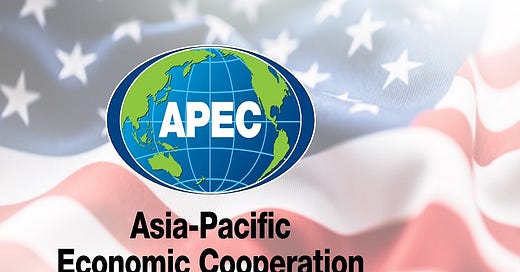The US’ APEC Outreach To Russia Proves That Washington Failed To Isolate Moscow
The US’ pragmatic approach to Russia’s participation in next year’s APEC meetings that it’ll host is a direct result of its policy failures and India’s related successes, both of which changed global affairs.
The US has promulgated a policy of isolating Russia from the international community and related fora across the present year since Moscow commenced its special operation in Ukraine. That approach has completely failed, however, as evidenced by none other than the US itself inviting Russia to participate in next year’s Asia-Pacific Economic Conference (APEC) meetings that it’s poised to host. Senior US official for APEC Mike Murray initiated this pragmatic outreach during a media briefing on Monday.
He explained this policy reversal on the basis of the US being “good stewards of APEC” during its chairmanship of the bloc next year, which in turn necessitates it inviting all participants without exception to partake in related events ahead of the 2023 APEC Leaders Meeting in San Francisco. His high-sounding rhetoric aside, America’s self-interested reason for flip-flopping on its prior policy of isolating Russia is that the aforesaid was actually isolating America itself.
Despite reconsolidating its previously declining unipolar hegemony over the Golden Billion throughout the course of the past ten months, the US pushed the Global South away like never before after showing them just how aggressively it’ll seek to impose its will upon all those dare to defy it like Russia did. Instead of coercing them into cowering before it out of fear that they’ll be the next target, they bravely resisted its pressure to make a powerful point about their principled neutrality in the New Cold War.
By doing the opposite of what the US expected, but which all objective observers who’d been following the Global South’s impressive pro-sovereignty strides over the past few years could have easily predicted would happen, Washington was forced into recalibrating its policy in order to accommodate for this reality. The political fantasy of isolating Russia never came to pass and actually served to be counterproductive to the US’ grand strategic goals, hence the urgent need to abandon this approach.
The Golden Billion’s anti-Russian sanctions will remain in place since they’re aimed at indefinitely perpetuating the decoupling of that targeted country and the EU, but this de facto New Cold War bloc’s American leader is obviously blowing the dog whistle that its proxies’ related efforts to squeeze Russia out of international fora should immediately stop. This stunning development wouldn’t have been possible had it not been for India once again flexing its principled neutrality earlier this month.
External Affairs Ministry (EAM) spokesperson Arindam Bagchi told a weekly media briefing on 1 December that “Russia is a member of the G20 and hence we would expect them to be participating in these processes” that India will host across the coming year of its chairmanship. Russian G20 Sherpa Svetlana Lukash subsequently supported EAM Dr. Subrahmanyam Jaishankar’s envisaged goal of his country becoming the voice of the Global South via that role, which dispelled claims of its G20 isolation.
As a result, the US had no practical choice but to let Russia participate in next year’s APEC meetings that it too plans to host across the coming year of its own chairmanship of that similarly influential economic bloc. Had India capitulated to American pressure to distance itself from Russia by signaling that it didn’t want that country’s representatives participating in the G20 processes that it’ll host, then there’s no doubt that the US would have continued to promulgate its policy of isolating Moscow from related fora.
The overarching trend is that the global systemic transition to multipolarity already far predated this year’s dramatic sequence of events that unprecedentedly accelerated it, so much so that these processes were already entrenched to the point of making it impossible for the US’ anti-Russian policy to succeed. American strategists hadn’t realized this, hence why they continued their counterproductive approach for so long, until India’s recent decision made it impossible to deny.
Faced with the new geostrategic reality of India having succeeded in its grand strategic goal of becoming a globally significant Great Power, which has in turn placed it on the trajectory of becoming the third pole of influence in the evolving bi-multipolar world order, the US’ promptly changed tack. Murray’s pragmatic approach to Russia’s participation in next year’s APEC meetings that his country will host is a direct result of the US’ policy failures and India’s related successes, both of which changed global affairs.




